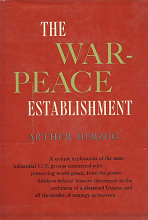
HERZOG : The war-peace establishment (fülszöveg)
In this comparative analysis of the War-Peace Establishment—the Deterrers, the Experimentalists, and those who endorse the Peace Movement—a well-known journalist conducts the reader on a unique, freethinking reconnaissance, investigating the men responsible for, as well as those opposed to, our nation's policies on thermonuclear war.
Here is Robert Strausz-Hupé, who advocates a forward strategy against Communism and explains that he is really a utopian. Here is Edward Teller, who wants peace but new weapons for destruction, too. Here are the analysts, Henry Kissinger, Thomas Schelling, Albert Wohlstetter, Herman Kahn and the "military intellectuals" of the RAND Corporation, who disagree on many things, but hold that the United States must practice deterrence and, at the same time, cooperate in limited ways with the Soviet Union in order to avoid a holocaust.
Here are the Realists, who maintain that power is innate in the affairs of men, but who think that the United States has overemphasized military power. Here are the Government Idealists with such policies as counterforce, the multilateral naval force, and counterinsurgency, all of which are meant to maintain, and spread, the influence of the free world in the absence of genuine disarmament agreements.
Experimentalists dispute the policy of massive nuclear deterrence. To them, peace, freedom and honor can best be achieved through reducing the nation's nuclear stockpiles and boldly forging disarmament agreements. Finally, there is the Peace Movement, which appeals to the conscience of individuals to move still faster to disarmament, to reject the use of force and, finally, to establish a warless world.
One goal: peace. Which road to it should we choose?